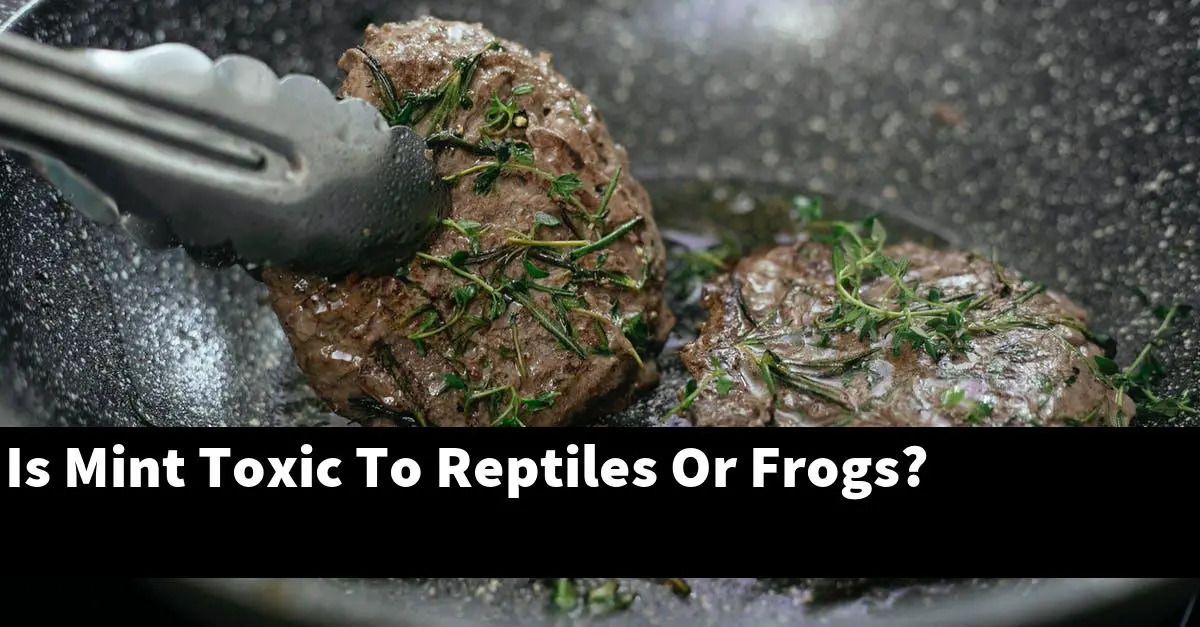Mint is a common household herb that is used in cooking and for its refreshing scent. While mint is generally considered safe for humans, it can be toxic to reptiles and frogs.
Mint contains a compound called methanol, which is toxic to these animals. If ingested, mint can cause vomiting, diarrhea, and seizures.
In severe cases, mint toxicity can lead to death. If you have reptiles or frogs as pets, it is best to keep them away from mint.
Are poison dart frogs poisonous in captivity?
Poison dart frogs are not poisonous in captivity.
What insects are bad for reptiles to eat?
There are many insects that are bad for reptiles to eat and there are many reasons for this.
One reason is that many insects contain a lot of toxins that can potentially harm a reptile’s health. Insects can also contain parasites and other harmful organisms that can make a reptile sick.
Another reason is that many insects are high in protein and other nutrients that can help a reptile grow and thrive, but some insects also contain toxins that can harm a reptile’s health.
It’s important to consult with a vet before giving any insects to a reptile as some can be harmful and others can contain nutrients that can help a reptile grow and thrive.
Is pothos toxic to reptiles?
Pothos is not toxic to reptiles, but there is not a lot of research on the topic. It is possible that pothos may be harmful to some reptiles if ingested in large quantities.
Some reptiles may also be uncomfortable climbing or rubbing against pothos plants.
Are ferns toxic to reptiles?
There is some debate over whether or not ferns are toxic to reptiles. Ferns can contain high levels of toxins which can be harmful to both animals and humans if ingested.
However, most experts believe that ferns are not toxic to reptiles.
Is philodendron toxic to reptiles?
Toxicity may vary depending on the specific philodendron species, the weight, age, and health of the reptile, and any additional medications or supplements the reptile is taking. Generally speaking, however, philodendron leaves and stems are not considered toxic to reptiles, and there is no evidence that they can cause adverse effects.
Are begonias safe for reptiles?
Begonias, like all plants, contain natural toxins that may be harmful to reptiles. If you are using begonias in a reptile enclosure, it is important to read the product label and make sure the begonia is safe for your reptile.
Is perlite toxic to reptiles?
No, perlite is not toxic to reptiles. It is a mineral composed of small, air-filled cells that is used as a soil amendment or as the primary packing material in some reptile cages.
What is wrong with my mint plant?
There could be a number of things wrong with your mint plant, but the most likely culprit is a deficiency of one or more nutrients. Follow these tips to help troubleshoot and correct the issue:
1. Check the soil pH. Mint plants prefer a soil pH around 6.5, so check the pH of your soil to make sure it’s in the correct range. If it isn’t, add an acidifying agent, such as sulfur or phosphoric acid, to adjust.
2. Check the soil nutrient levels. Mint plants need nitrogen, phosphorus, potassium and magnesium.
Check the levels of these nutrients in your soil and add supplemental nutrients if necessary.
3. Check the water requirements of your mint. Mint plants need moderate levels of water, so make sure the soil is moist but not wet.
4. Check the pH of the water your mint is receiving. Mint plants get their water from soil and groundwater, so make sure the water your mint is receiving is also in the correct pH range.
5. Check for pests. Mint plants are susceptible to pests, so check for signs of infestation, such as yellowing or wilting leaves, and treat if necessary.
Does mint repel bugs?
There is no scientific evidence to support the belief that mint repels bugs. Some people may believe this to be true because mint smells unpleasant to bugs, but this is not actually the case.
In fact, some studies have shown that mint can actually have the opposite effect and attract bugs. The reason behind this is not completely clear, but it may have to do with the fact that mint is a natural pesticide.
What is poisonous to reptiles?
Most common poisonous plants to reptiles are deadly nightshade family plants such as black nightshade, cherry pepper, and potato vine. Other poisonous plants that can be harmful to reptiles include, but are not limited to, ivy, rue, lily of the valley, and amaranth.
Is dieffenbachia safe for reptiles?
Dieffenbachia can be a safe plant for reptiles. However, it is always important to consult with a reptile expert to ensure that the plant is safe for your reptile.
Are peace lilies safe for frogs?
There are many different types of lilies, and not all of them are safe for frogs. The peace lily is one of the plants that frogs are most likely to be harmed by, as it contains toxins that can kill them.
Additionally, some lilies can cause skin irritation and redness in frogs, so it’s important to research which types of lilies are safe for them before using them in a garden or setting.
Summary
Mint is not toxic to reptiles or frogs. In fact, it can be beneficial to their health.
Mint can help to soothe an upset stomach and can also act as a natural insect repellent.

